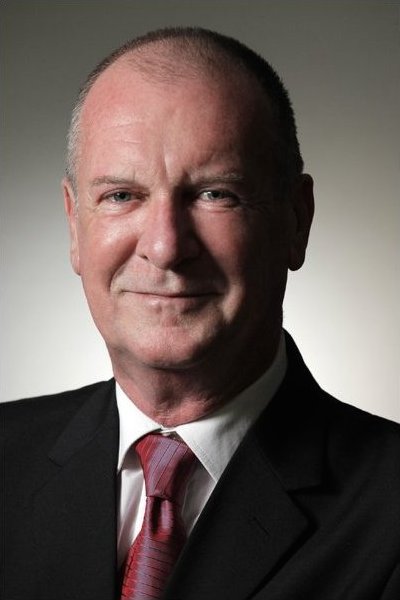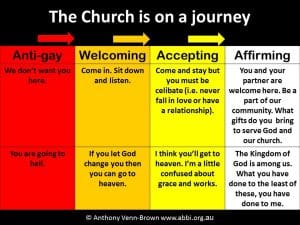LGBTQ welcoming, accepting, affirming. What’s the difference?
People often ask me what the difference is between welcoming, accepting and affirming churches. This little infograph will give you some idea.
Some churches refuse to go on the journey. Some began the journey, then got stuck, afraid of the potential for controversy and conflict. Others have continued to take brave steps in faith towards creating a completely affirming congregation where the sign at the front that says ‘All welcome’ actually means that. While this graphic is simplistic and other terms have been used such as ‘inclusive’ and ‘reconciling’ it serves a point. It’s a journey. Some are further behind than they think. Some have a long way to go.
Two things I have learned over the years.
- This journey will be one of several years for a church. No one moves from anti-gay to LGBTQI-affirming overnight. This is even more true for a church or denomination. It’s like a giant ocean cargo vessel changing course.
- The journey cannot be taken without involvement with LGBTQI people. No conversation about us without us.
Whilst some Christian leaders have preached hatred and the media given oxygen to the fringe lunatics of Christendom, many others hoped if they just closed their eyes or buried their heads in the sand, eventually the issue would go away. I’ve often said that the problem is not so much homophobia but subjectaphobia; they would rather just not go into the volatile space of the faith and sexuality ‘debate’. It’s such a divisive issue.
But now churches are having to come to terms with the fact that in a growing number of western countries marriage equality has or is becoming a reality. This means that gay and lesbian couples may come into their churches who have a nationally or state recognized, legal marriage. Some will be parents. They are no longer gay, lesbians or “homosexuals;” they are believers, committed church members and families.
The longer churches put this issue on the back burner, the further behind they become. Considering the progress made in scientific research, changes in the law, acceptance of diversity in the corporate world and that since 1973 homosexuality has not been considered a mental disorder; some churches are 40 years out of date on the issue of homosexuality. Church, you must catch up and make this a priority. Every day delayed means that LGBTQI people are harmed and lives lost.
If churches continue to hold on to the outdated Christian belief that homosexuality is a sin, then it makes them increasingly irrelevant to those who have gay and lesbian friends, family members and work colleagues. The previous Christian labels of unnatural, perverse, evil and even abomination not only do not fit, but they are also offensive to LGBTQI people and their friends and family.
My hope and prayer is that this will be an ongoing conversation that takes ALL churches to a place where LGBTQI people are treated with respect and equality. Not just welcoming churches, or accepting churches but truly affirming churches.
Welcoming = you’re welcome BUT…….
Accepting = we accept you BUT……..
Affirming = we love you FULL STOP.
It’s a journey we MUST go on if we profess to serve humanity with unconditional love.
People of color were once told to go to the back of the bus. Women were once told their place was in the home. The paradigm shifts in understanding that happened in the western world regarding people of color and women’s equality, are now happening in regard to sexual orientation and gender identity.
It’s important to remind churches that having a conversation about us without us will usually be nothing more than a recycling of preconceived ideas and misconceptions. Imagine another group of male church leaders discussing the role of women in the church without females present? We would call that misogyny. Or church leadership again discussing indigenous issues without consulting indigenous people themselves. How could they have any insight into what their life experience is all about? We would call that white supremacy/racism/elitism.
The church has done a great deal of talking about us but rarely has spoken with us. So, when church leaders discuss LGBTQI people, relationships, and the community without speaking with or spending time getting to know LGBTQI people, it does beg the question why. What is there to fear? Why the exclusion? Is this further evidence of homophobia and transphobia that is regularly denied?
It’s time for the church to invite LGBTQI people into the conversation. For some this is a conversation about their thoughts and beliefs, but for us it is about who we are. You can ask questions.
- ‘What was it like to sit in church and hear the word abomination used to describe you?’
- ‘What was it like to get to the point of accepting that you were gay and coming out, knowing you might be rejected by those you love and the church and God you’ve served?’
- ‘How did you find resolution of your Christian beliefs and your sexuality?
- ‘When you came out to your Christian friends at church and they told you that you could never fall in love or have a partner for life as they could – how did that make you feel?’
- ‘What did it feel like when your mega-church pastor said you couldn’t serve coffee to people after church because you’d shared with him you were in a committed, monogamous three-year relationship?’
- ‘How did you feel when you confided in your pastor that you thought you might be gay, resulting in him removing you from the kid’s ministry you loved so much, even though you had never acted on those feelings?’
In listening to our stories churches will learn.
Over the years, I have been privileged to be a part of many of these conversations. Some have been mega-church pastors (but that’s another story). Until now, it has always been Anthony Venn-Brown knocking on the door asking ‘can we talk’. This is how the dialogue began. The day will come, and it’s not far away when churches, denominations and religious organizations will take the initiative and request ‘please come and help us, we have much to learn.’
Ambassadors & Bridge Builders International was founded to serve the church and religious organizations in these areas through seminars, workshops and consultancy. Through years of listening to the personal stories of thousands of LGBT men and women, together with many hundreds of conversations with Church pastors and leaders, I believe I have identified ten key issues, that if lovingly resolved, will build bridges of welcome, acceptance and affirmation to all men and women regardless of their sexual orientation.
To my LGBTQI family, it is not only about them; it is also about us. Homophobia and transphobia and the closet are allies. Like an unhealthy co-dependent relationship, they need each other to survive. One plays the victim living in fear and shame while the other plays the persecutor policing what is ‘normal’. The only way to dismantle homophobia is for every gay man and lesbian in the world to come out and live authentic lives. Once they realize how normal we are and see themselves in us….the controversy is over.

One of Australia’s foremost commentators on faith and sexuality, Anthony Venn-Brown OAM is the author of the best-selling autobiography A Life of Unlearning, which details his journey from being one of the first in the world to experience religious gay conversion therapy, to becoming a married, high-profile preacher in Australia’s growing megachurches (including the precursor to Hillsong), to living as an openly gay man. Founder and CEO of Ambassadors & Bridge Builders International, he was awarded the Order of Australia Medal (OAM) for service to the LGBTIQ community.

